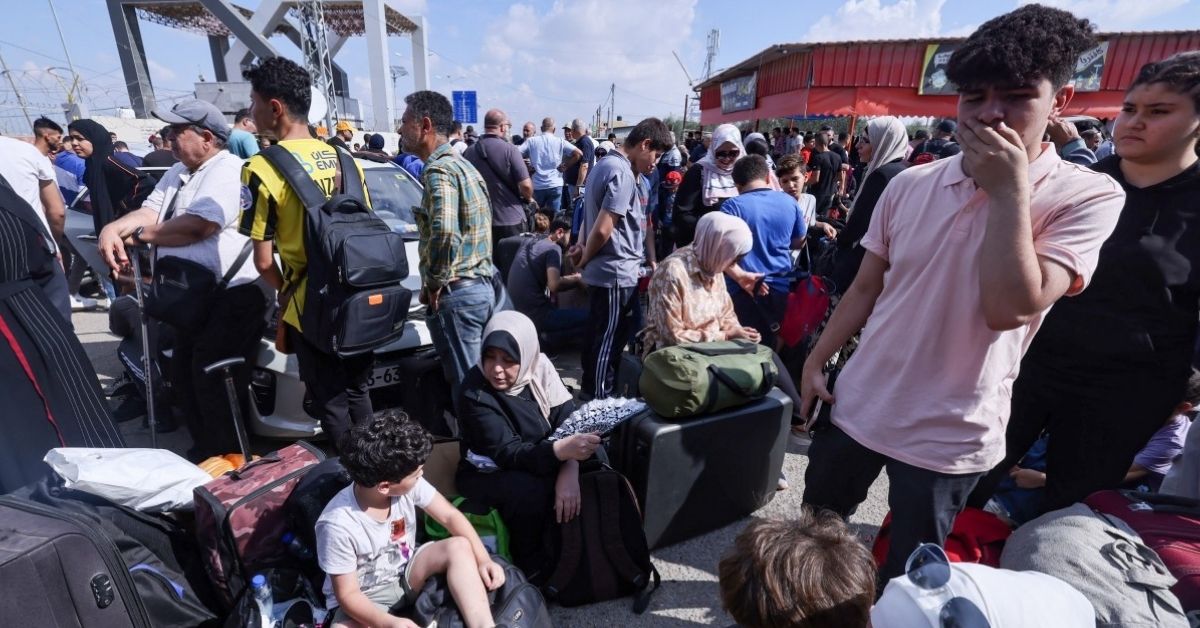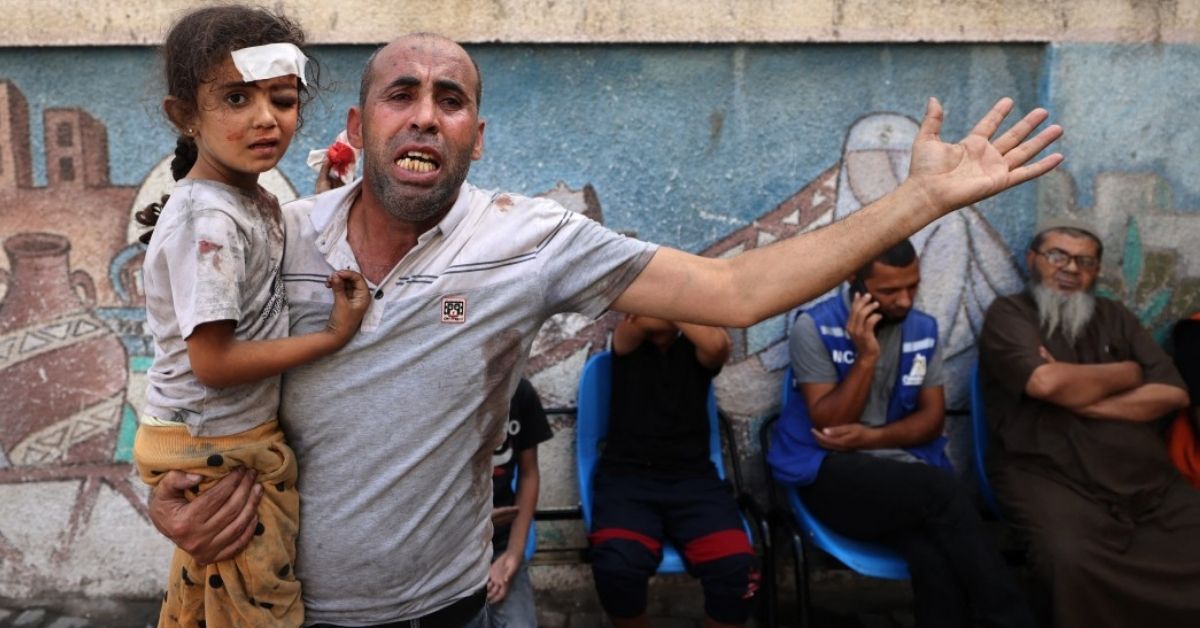BEIRUT — The entire world is closely monitoring the current situation between Gaza and Israel. On October 14, Israel advised the residents of the northern Gaza Strip – approximately 1.1 million people out of a total population of 2.4 million — to evacuate to the south. Gazans anticipate strikes aimed at “destroying the center of operations of the Islamist movement Hamas.”
This offensive was long anticipated, but no one foresaw it when Hamas entered Israeli territory and attacked its southern region on October 7, 2023, causing chaos in the country’s security and resulting in thousands of casualties.
While analyzing the ongoing conflict, it’s crucial to recognize the recurring patterns of recent history and consider their potential impact on neighboring countries like Lebanon, Jordan, and Egypt. Given the current events, what will be the repercussions for these neighbors?
Lebanon: A Divided State
“Lebanon, as a country, has no stake in the current conflict,” says Christian Taoutel, PhD in History and Head of the Department of History and International Affairs at Saint Joseph University in Beirut. He alludes to Hizbollah’s presence as a “distinct entity” operating within Lebanese borders.
“Hizbollah’s presence and strategy in Lebanon are similar to those of Hamas in terms of military, political, and media operations. The pro-Iranian Shiite group and the Palestinian Sunni group have experienced strained relations due to the war in Syria and Hamas’s support for the Syrian rebels. However, the two organizations have a shared characteristic: they both operate as external military factions outside the countries they are based in. Both groups have aligned goals: they are part of the resistance axis and take directions from Iran,” Taoutel elaborates.
At a glance Immediate Concerns: Gazans currently anticipate strikes targeting the "center of operations of the Islamist movement Hamas." This move was unexpected, especially after Hamas's attack on Israel's southern region on October 7, 2023, which led to significant casualties. Lebanon's Stance: Christian Taoutel, PhD in History and Head of the Department of History and International Affairs at Saint Joseph University in Beirut, emphasized that Lebanon, as a nation, is not directly involved in the conflict. However, the presence and strategies of Hizbollah, a "distinct entity" within Lebanon, mirror those of Hamas. Both groups, despite their differences, share a common goal and receive directives from Iran. Historical Context: The recent conflict marks a departure from the past 50 years. Charbel Bou Maroun, founder of the Mechriq research center, highlighted Israel's traditional wariness of conflicts with Hamas due to potential demographic losses. However, the current situation, with over 1,400 Israeli casualties, might challenge this stance. Tunnel Concerns: The northern Palestinian territory, heavily fortified by the Israeli army, is known for its extensive tunnel networks. Hamas utilizes these tunnels, some reaching depths of 100 to 130 feet, to hide fighters and weapons. Regional Impact - Egypt and Jordan: The conflict's repercussions are felt in neighboring countries. Egypt, which once governed the Gaza Strip, now fears a massive refugee influx into its volatile Sinai region. Meanwhile, Jordan maintains a neutral stance, with King Abdullah emphasizing the need to address the humanitarian crisis within Gaza and the West Bank. International Aid and Lebanon's Involvement: Dr. Taoutel stressed the importance of international aid for Gaza, noting that Lebanon would benefit from stability in Palestine. However, there's skepticism about Lebanon's involvement, especially with Hamas gaining international support. Future Uncertainties: Israel's stance towards Hizbollah and Hamas remains cautious. While Israel has expressed no desire for conflict along the Lebanese borders, the recent neutralization of four attackers at the Lebanon-Israel border indicates the volatile nature of the situation.
On one side, Hizbollah is currently observing the situation in Gaza and awaiting developments related to Iran’s revolutionary movement. On the other, both France and the U.S. have cautioned Lebanon against getting involved in the ongoing conflict and siding with Hamas. Despite these international warnings, the pro-Iranian group might not consult the Lebanese government or public opinion and could instead follow directives from Tehran.
Many analysts believe that Israel’s ground invasion of the northern Gaza Strip could prompt Hizbollah to intervene. At a demonstration in support of the Palestinians in Beirut on October 13, Sheikh Naïm Qassem, Hizbollah’s deputy leader, said that the movement was prepared to step in “at the right time.”
Recurring Patterns or a New Conflict?
While today’s events are largely unprecedented, historical insights can provide context. The conflict that began on October 7 marked a significant shift from recent history, being the first of its kind in 50 years.
“Israel has always been wary of wars with Hamas because it couldn’t afford significant demographic losses,” says Charbel Bou Maroun, founder of the Mechriq research center. However, today’s events might challenge this caution. The number of casualties and perceived breaches in Israeli security are unmatched. Over 1,400 people have died in Israel, with the majority being civilians, based on the latest Israeli data. In retaliation, Israel’s actions resulted in at least 2,670 deaths in Gaza, primarily Palestinian civilians, including many children, as reported by local authorities.
If my neighbor is in distress, so am I. The Palestinian people undoubtedly need all the international aid directed to Gaza, and Lebanon, as a nation, will surely benefit – both geopolitically and morally – from any stability offered to the Palestinians.
Prof Christian Taoutel of Beirut’s Saint Joseph University.
“This incident could diminish Israel’s image as a safe country, making it crucial for the government to restore trust among its citizens and on the global stage, regardless of the cost,” explains Toni Nissi, president of the International Lebanese Committee for UN Security Council Resolutions for Lebanon.
“In the past, smaller operations often took place between Israel, Lebanon, and Palestine, marked by well-defined rules of engagement. However, the events of October 7 disrupted this pattern, indicating a change in strategic dynamics,” Nissi adds.
“Israel might have underestimated Hamas. A similar attack from Hezbollah could have been even more devastating. The existence of tunnels between Lebanon and Israel is also a significant concern. Additionally, Qatar has been one of the countries financially supporting Hamas in exchange for maintaining relative peace in the region – an agreement that has now faltered. Currently, Israel aims to restore international trust and reestablish itself as a global power while ensuring its citizens’ safety,” he elaborates.

The northern part of the Palestinian territory, where the Israeli army has amassed its troops, is filled with tunnels. Hamas uses these tunnels to shelter its fighters and weapons, sometimes as deep as 100 to 130 feet underground. The Iranian minister recently stated that the “axis of resistance” would not permit the Jewish state “to act as it pleases in Gaza.”
What about Egypt and Jordan?
The ongoing conflict has impacted neighboring countries, including Jordan and Egypt, in different ways.
“Egypt governed the Gaza Strip for two decades under a military governor’s leadership, before Israel seized the Gaza Strip in the 1967 Middle East war and ousted the Egyptian administration,” said Bou Maroun. Egypt is concerned that the conflict might result in a massive influx of two million refugees from Gaza into the already volatile Sinai region, which the government has had challenges managing effectively.
Israel has always been wary of wars with Hamas because it couldn’t afford significant demographic losses.
Charbel Bou Maroun, founder of Mechriq Research Center
According to the UN, one million people have migrated from the north of the Gaza Strip to the south within a week. On Monday, October 16, hundreds gathered at the border with Egypt, hoping to open the Rafah crossing, which Egypt oversees. However, individuals with both Palestinian and international passports are facing difficulties crossing the border.
“The peace treaty between Egypt and Israel outlines specific terms related to soldiers and refugees between the two countries, adding layers of complexity to the situation,” the research center’s founder elaborates.
Egypt is keen to prevent another wave of Palestinian refugees. The country is already grappling with the influx of over 317,000 refugees from the civil war in Sudan. The Egyptian government doesn’t have the capacity to accommodate the potential large number of Palestinians in Sinai, a region distant from Cairo that has had its own challenges with extremism.
When it comes to Jordan, the Kingdom appears to maintain a neutral position regarding the conflict, refuting claims that Jordanian military bases were utilized by the U.S. army to transport supplies to Israel.
This incident could diminish Israel’s image as a safe country, making it crucial for the government to restore trust among its citizens and on the global stage, regardless of the cost.
Toni Nissi, president of the International Lebanese Committee for UNSC Resolutions for Lebanon
However, as reported by Reuters, Jordan’s King Abdullah cautioned on October 17 against efforts to push Palestinian refugees into Jordan or Egypt. He emphasized that the humanitarian crisis should be addressed within Gaza and the West Bank.
“This is a red line because, in my view, some usual suspects are trying to use it as an excuse to create de facto issues locally,” the Jordanian King remarked. After a meeting with German Chancellor Olaf Scholz in Berlin, King Abdullah firmly stated, “No refugees in Jordan, no refugees in Egypt.”
The UN Security Council, on October 17, turned down a Russian-proposed resolution advocating for a “humanitarian ceasefire” between Israel and Hamas. Attempts to deliver aid to Gaza have faced Israeli resistance, restricting the aid flow. This has also resulted in the cutoff of water, electricity, and food supplies in the Hamas-governed territory.
On October 17, aid convoys located in Egypt’s Sinai region moved towards Rafah, with no clarity on whether the border would be reopened. On the Israeli side, close to 500,000 Israelis have been displaced, as noted by Israeli army spokesperson Jonathan Conricus.
Highlighting the significance of international aid, Dr. Taoutel said, “If my neighbor is in distress, so am I. The Palestinian people undoubtedly need all the international aid directed to Gaza, and Lebanon, as a nation, will surely benefit – both geopolitically and morally – from any stability offered to the Palestinians.”

Skepticism about Lebanon’s Involvement
Hamas’ actions have garnered international support for Israel, especially in the U.S. and Europe. In contrast, the Arab League, traditionally backing the Palestinian cause, has voiced profound concerns about the humanitarian crisis in Gaza. Saudi Arabia, a pivotal figure in peace talks, has declared a temporary halt in all normalization efforts with Israel. Additionally, the United Arab Emirates has denied any connection between the presence of U.S. military aircraft at Abu Dhabi’s al-Dhafra airbase and the conflict between Hamas and Israel.
“Many European nations remain uncertain about sending aid to Gaza, especially countries like France and Germany, whose citizens are among those killed or abducted,” says Toni Nissi. This strong international support could potentially empower Israel to consider the full elimination of Hizbollah.
For Israel, Hizbollah and Hamas are often seen as a singular threat. However, the country declared on Sunday, October 15, that “it does not seek any conflict along the Lebanese borders.” Still, actions concerning such opponents must be thoughtfully weighed. The Israeli army reported on Tuesday that it had neutralized four attackers during an infiltration attempt at the border with Lebanon.
If Lebanon sides with Hizbollah in this conflict, the country could face significant humanitarian and geopolitical challenges, especially given its ongoing economic and political turmoil. As a result, “a race between diplomatic resolutions and escalating conflict” is unfolding, as M. Nissi describes.
Israel might decide to confront Hamas independently, or it could choose to target all Iranian-backed groups in the area, including Hizbollah. The future will provide clarity on this matter.

